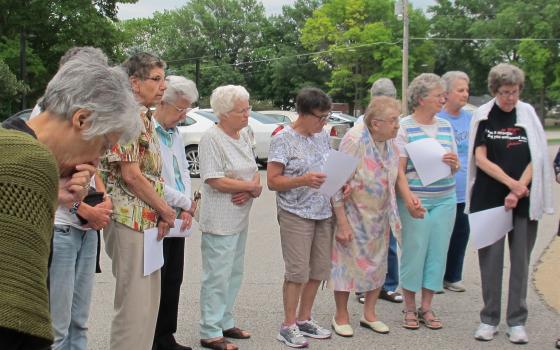For decades, it was considered impossible to study criminal sentencing disparities because every case is different, with distinctive context, background, history and circumstances. But that is changing, and the results are beyond troubling.
In September, I wrote about the Sarasota Herald-Tribune's "Bias on the Bench" project, a landmark examination of the criminal justice system in Florida and the racial bias so inherent in it.
Now, a new study has examined data on more than half a million defendants and found what a difference politics makes: Judges appointed by Republican presidents gave longer sentences to black defendants and shorter ones to women than judges appointed by Democrats, The New York Times reported.
The newspaper said the Harvard Law School professors who conducted the study analyzed the sentencing practices of about 1,400 federal trial judges over more than 15 years, finding that "Republican-appointed judges sentence black defendants to three more months than similar nonblacks and female defendants to two fewer months than similar males compared with Democratic-appointed judges."
"These differences cannot be explained by other judge characteristics and grow substantially larger when judges are granted more discretion," the report added.
These massive studies show that sentencing disparities can be reliably examined, meaning the injustice built into the justice system can no longer be excused by arguing it is impossible to have objective data.
The cost of family separation
Journalist's Resource, a project of the Harvard Kennedy School's Shorenstein Center and the Carnegie-Knight Initiative, is an open-access site that curates scholarly studies and reports on current events to give journalists a deeper understanding. Its latest collection includes a sampling of peer-reviewed studies that investigate the potential impacts of separating immigrant children from their parents at the border.
There are 12 studies listed, including two on general separation issues, two on separation caused by incarceration and two on separation caused by immigration policy, including both detention and deportation.
More women religious issuing statements calling immigration policy unjust
The Congregation of the Humility of Mary held its annual general assembly in June at St. Ambrose University in Davenport, Iowa, and used the occasion to issue an action statement on comprehensive immigration reform, just in time for the national debate over immigration policy and the practice of separating asylum-seeking families at the border.
"What does love your neighbor as yourself mean? Certainly not separating parents and their children," said Sr. Mary Ann Vogel, president of the congregation.
The statement, adapted from a similar statement of the Sisters of Charity of the Blessed Virgin Mary, notes the congregation's founding members were themselves immigrants from France.
Calling current immigration policy "radically unjust," the statement calls "for a halt to immoral policies and practices."
"Paramount among these are the separation of children from parents, the housing of children in detention centers, the cruel uncertainty clouding the lives of eligible DACA recipients for whom this nation is their only home, and the closing of our doors to asylum seekers," the statement says, noting that hundreds of thousands of people at U.S. borders are "enduring irreparable harm."
New leadership for IHM sisters
On June 30, the five members of the 2018 Leadership Council of the Sisters, Servants of the Immaculate Heart of Mary of Monroe, Michigan, took office, the congregation announced.
The leadership team, which will serve until 2024, includes Sr. Mary Jane Herb, president; Sr. Marianne Gaynor, mission councilor/vice president; Sr. Margaret Chapman, mission councilor/treasurer; Sr. Patricia McCluskey, mission councilor; and Sr. Ellen Rinke, mission councilor.
In her reflection during the celebration, Herb quoted a section of Pope Francis' prayer at the conclusion of his environmental encyclical, Laudato Si', on Care for Our Common Home”:
Fill us with peace, that we may live
as brothers and sisters, harming no one.
O God of the poor,
help us to rescue the abandoned and forgotten of this earth,
so precious in your eyes. …
Touch the hearts of those who look only for gain
at the expense of the poor and the earth.
Teach us to discover the worth of each thing,
to be filled with awe and contemplation,
to recognize that we are profoundly united
with every creature
as we journey towards your infinite light. …
Encourage us, we pray, in our struggle
for justice, love and peace.
Legal ground to stand on
Want to continue to argue about President Donald Trump's ban on travel from several majority-Muslim countries, which the U.S. Supreme Court upheld June 26, but want to ensure you have a real grounding in the legal arguments?
The U.S. Conference of Catholic Bishops, the Catholic Legal Immigration Network and Catholic Charities teamed up to file an amicus brief in the case, Trump vs. Hawaii. Not only does the brief summarize the moral arguments against Presidential Proclamation No. 9645, but it details the legal and constitutional arguments against the policy.
The conservative majority of the court may have ignored those arguments, but you can still find them here so you can explain why you believe the court was wrong.
Remember, links, tips and accounts of the work of women religious are always welcome at [email protected].
[Dan Stockman is national correspondent for Global Sisters Report. Follow him on Twitter or on Facebook.]

